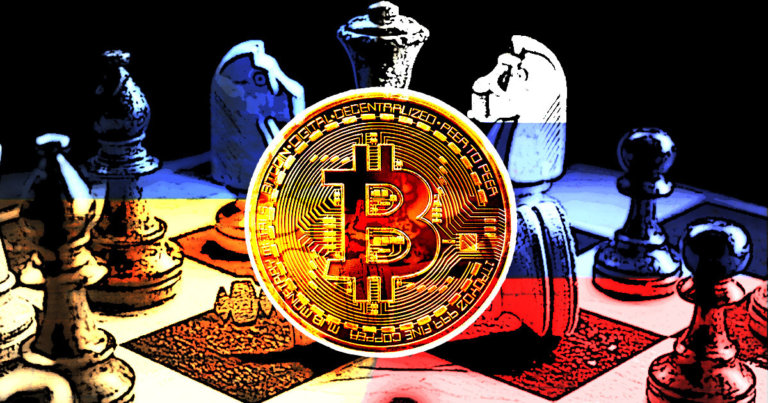 Here’s how recent geopolitical tensions affected the crypto market
Here’s how recent geopolitical tensions affected the crypto market Here’s how recent geopolitical tensions affected the crypto market
From the outset and consequences of the Covid-19 pandemic, combined with the invasion of Ukraine by Russia, global economies have taken quite a beating. This chaotic combination has increased volatility in the cryptocurrencies market.

Cover art/illustration via CryptoSlate. Image includes combined content which may include AI-generated content.
The recent geopolitical tensions in Russia and Ukraine have dramatically affected the prices of cryptocurrencies. When Russian President Vladimir Putin announced a “military operation” in Ukraine, the crypto market went down by 10%. However, the very next day, the market recovered, and new highs were recorded. Bitcoin, which went down by 8%, rose by over 15% in the next seven days. Other cryptocurrencies like Ethereum and Altcoins have also witnessed significant surges in their prices.
This was quite contrary to the world’s expectations: as the major markets were collapsing, the crypto market stood strong in the face of geopolitical tensions. This demonstrated the potential of cryptocurrencies as an alternative financial system that offers new ways to transact and hold assets even in the midst of political chaos. However, the political tensions have definitely increased the volatility of cryptocurrencies as their values fluctuate almost every day.
Responding to the invasion, the European Union, Japan, the United States, and Australia have imposed sanctions on Russia and its financial institutions, which has increased the pressure on the Russian currency – the Ruble. While Ukraine is receiving millions of dollars of cryptocurrency in donations, the Russian Ruble is trying to save itself through crypto-assets. The next day after the Russian invasion of Ukraine, the trading volume of the Ruble went up by 260%. Similarly, in Ukraine, where cryptocurrency is now a legal tender, the transactions in Ukrainian Hryvnia have recorded unprecedented highs.
Although crypto exchanges are facing high pressure to block any transactions with Russia, they have stood strong and not taken any such step. They maintain that such sanctions are not only feasible but also cannot be effective for an institution as large as Russia. Besides that, the traceability of blockchain chain technology will not allow Russia to replace billions of dollars of funds into crypto assets. So, a safe haven may not be possible at all.
How is the Conflict Rallying Crypto Prices?
Before the Russian invasion, cryptocurrencies were trading like other risky assets such as technology stocks. However, after the invasion, investors started viewing cryptocurrency as a reserve for their assets which are devaluing due to these tensions. There are several conflict-related reasons that are affecting the prices of cryptocurrencies and the crypto market. They include:
Crypto Donations
On February 26, the Ukrainian government appealed to the crypto community to donate to the cause. This was the first time any government accepted donations in cryptocurrency. Until now, it has received $100 million dollars worth of donations in cryptocurrency. The donations were collected through the fund run by the Ukrainian crypto exchange Kuna. The founder of Polkadot, Gavin Wood, alone made a donation of $5.8 million to the cause.
Traditional Banks
Given the conflict, it is becoming increasingly difficult to rely on traditional banks to hold their money. The inflation in the US is rising at the fastest pace like never seen before. Additionally, the volatility of the stock market has increased by 80%. With cryptocurrencies coming to the rescue for both the Ukrainian and Russian population, crypto advocates also speculate that digital currencies will become more mainstream.
This is not just the case of Russia and Ukraine; other countries which are directly or indirectly involved in the conflict, like the US, Canada, and European Union, are also witnessing inflation. Their national currencies are going down, and people are losing trust in the traditional banking system. For them, cryptocurrencies are serving as an alternative vehicle of investment.
Increased Demand
Recent geopolitical events have increased the general demand for cryptocurrency due to its decentralized nature. They do not need a centralized institution to initiate the transfer of funds. And as such, the reliance on central banks becomes minimal. Correspondingly, this decentralized nature of cryptocurrency has allowed Russian and Ukrainian individuals to transfer their money anywhere without being affected by any sanctions imposed on them. Besides this, the value of the Russian Ruble is continuously going down, which is why Russian nationals are looking for refuge by converting the currency into cryptocurrency to save it from further devaluation.
A Crypto Ban is No Solution
The current developments in the political and financial sector have shown that banks and centralized state institutions can no longer control all the financial instruments of the economy, especially decentralized cryptocurrencies. Even though big exchanges like Coinbase and Binance are facing immense pressure from the government to ban transactions from Russia, they have indicated their clear intention in trying their best to not follow those orders. They have cited several reasons why such a ban would not produce any concrete results and even target the integrity of cryptocurrency.
Firstly, a ban will be a direct contradiction to the values of decentralization, freedom, and autonomy that underline the fundamentals of cryptocurrency. Additionally, freezing the crypto assets and transactions of Russian users will not only affect them but also other users on the blockchain network.
Besides that, it is impossible to universally regulate the crypto industry because there are thousands of crypto exchanges all over the world, many of which are local and less compliant to regulations. This means even if big exchanges sanction Russian users, they will just turn to the smaller ones, and the problem will remain intact.
However, the future path of cryptocurrencies remains uncertain as the prices of oil are skyrocketing due to the sanctions on Russia. Bitcoin and other cryptocurrencies usually require an enormous amount of energy for mining and verifying computer transactions.
The rise in energy costs might impact the prices of Bitcoin sooner or later, depending on how this political situation unfolds. And as such, crypto users are hoping for the situation to stabilize, which might bring some kind of stability in the value of cryptocurrency, which is highly volatile.
Even though the crypto market stood firm in the face of geopolitical tensions, the future prices of cryptocurrency will depend on further political and economic developments.







































































































